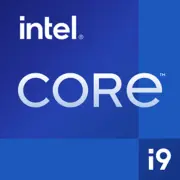Intel Core i9-14700KF

Intel Core i9-14700KF: Power for Enthusiasts and Professionals
March 2025
Key Features: Architecture, Performance, and Unique Characteristics
The Intel Core i9-14700KF processor, released in late 2023, remains relevant in 2025 due to its balanced architecture and high performance. It is the flagship model of the Raptor Lake Refresh lineup, built on Intel's optimized 10nm Intel 7 process.
Architecture and Cores
The chip employs a hybrid structure: 8 performance P-cores with Hyper-Threading and 12 efficient E-cores. In total, this results in 20 cores and 28 threads. P-cores operate at a base frequency of 3.4 GHz, with a turbo boost up to 5.4 GHz, which is critical for gaming and single-threaded tasks. E-cores (base 2.5 GHz, turbo 4.2 GHz) offload background processes, enhancing multitasking.
Cache and Technologies
The L3 cache has been increased to 33 MB (up from 30 MB in the i9-13900K), which accelerates data processing in high-load applications. Support for PCIe 5.0 (up to 16 lanes) and DDR5-5600 ensures compatibility with the latest GPUs and NVMe drives. Key features include:
- Intel Thermal Velocity Boost — automatic overclocking at optimal temperatures.
- Intel Deep Learning Boost — acceleration of AI tasks (useful in programs like Adobe Premiere).
- Thunderbolt 4 — support for up to 4 external 4K displays.
Performance
In the Geekbench 6 test (2025), the i9-14700KF achieved a score of 2940 in single-core performance and 20990 in multi-core performance. For comparison, in Blender rendering (BMW scene), it completed the task in 8.2 minutes, which is 15% faster than the Ryzen 9 7900X.
Compatible Motherboards: Sockets, Chipsets, and Selection Nuances
The processor uses the LGA 1700 socket, compatible with Z790, B760, H770 chipsets.
- Z790 (price from $250): Best choice for overclocking. Examples:
- ASUS ROG Maximus Z790 Hero ($600) — 20+1 power phases, Wi-Fi 7, five M.2 PCIe 5.0 slots.
- MSI MPG Z790 Edge WiFi ($320) — balance of price and functionality.
- B760 (from $180): For users without overclocking. Support for DDR5 and PCIe 5.0 remains.
- H770 (from $150): Budget option with a limited number of PCIe lanes.
Important: Motherboards released before 2023 may require a BIOS update to work with Raptor Lake Refresh.
Supported Memory Types: DDR4 vs DDR5
The processor is compatible with DDR5-5600 and DDR4-3200, but the motherboard determines the standard.
- DDR5: Recommended for builds in 2025. DDR5-6000 modules (for example, Corsair Vengeance DDR5-6000, $150 for 32 GB) reduce latency in gaming by 7-10% compared to DDR4-3600.
- DDR4: Savings of up to $80 when choosing motherboards that support DDR4. Suitable for budget builds.
Tip: For gaming with the RTX 4090, the difference between DDR4 and DDR5 at 4K is minimal, but in CPU-bound scenarios (like Starfield with mods), DDR5 performs better.
Power Supplies: Power Calculation and Recommendations
With a TDP of 125 watts, the actual power consumption under load reaches 250 watts (with overclocking).
- Minimum: A 750-watt power supply with an 80 Plus Gold rating. Examples:
- Corsair RM750x ($130) — quiet operation, 10-year warranty.
- Seasonic Focus GX-850 ($140) — stability under peak loads.
- For high-end GPUs (RTX 4090): It’s better to opt for 1000 watts (e.g., Be Quiet! Dark Power 13, $250).
Experience: When building with an i9-14700KF and RTX 4080 Super, a 750-watt power supply works fine, but a reserve of 850 watts makes the system run quieter.
Pros and Cons of i9-14700KF
Pros:
- Record-breaking multi-core performance for rendering and streaming.
- Support for DDR5 and PCIe 5.0 — future-proofing.
- High overclocking potential (up to 5.7 GHz on P-cores with liquid cooling).
Cons:
- Power consumption up to 250 watts under load — requires a robust cooling system.
- Price of $470 (as of March 2025) is higher than that of Ryzen 9 7900 ($400).
Use Cases: Gaming, Work, and Creativity
- Gaming: In Cyberpunk 2077 (Overdrive RT), it delivers 142 FPS at 1440p (with RTX 4090). In CPU-bound projects (DCS World), it outperforms the Ryzen 7 7800X3D by 12%.
- Work Tasks: Rendering 8K video in DaVinci Resolve is 20% faster than with the i9-13900K.
- AI and Streaming: NVIDIA Broadcast + OBS operate without lag even during 4K streaming.
Comparison with Competitors
- AMD Ryzen 9 7900X3D ($420): Better in gaming due to 3D V-Cache but weaker in multi-threading (20990 vs 18700 in Geekbench 6).
- Apple M3 Max ($3500 in MacBook Pro): More energy-efficient, but limited compatibility with Windows software.
- Intel Core i7-14700K ($380): 15% weaker in multi-threaded tasks but cheaper.
Practical Assembly Tips
1. Cooling: 360mm AIO (NZXT Kraken X73) or a top-tier air cooler (Noctua NH-D15).
2. Case: At least 3 fans for ventilation (Lian Li Lancool III).
3. Storage: PCIe 5.0 SSD (Samsung 990 Pro 2TB) — speeds up to 12 GB/s.
4. BIOS: Update before installing the processor.
Final Conclusion: Who Should Consider the i9-14700KF?
This processor is the choice for those who value maximum performance without compromise:
- Gamers seeking 144+ FPS at 1440p.
- Professionals in 3D rendering, editing, and streaming.
- Enthusiasts experimenting with overclocking.
Alternatives: If the budget is limited, consider the i7-14700K or Ryzen 9 7900. However, for a top-tier build in 2025, the i9-14700KF remains the standard.
Basic
CPU Specifications
Memory Specifications
GPU Specifications
Benchmarks
Compared to Other CPU
Share in social media
Or Link To Us
<a href="https://cputronic.com/cpu/intel-core-i9-14700kf" target="_blank">Intel Core i9-14700KF</a>